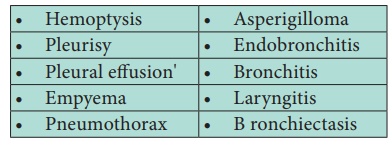Causative organism, Clinical manifestations, Treatment, Control measures - Tuberculosis | 12th Nursing : Chapter 11 : Communicable Diseases
Chapter: 12th Nursing : Chapter 11 : Communicable Diseases
Tuberculosis
Diseases Transmitted Through Air
Tuberculosis
Definition - Tuberculosis is a chronic infection disease caused by
tubercle bacilli. The disease primarily affects lungs and causes pulmonary
tuberculosis. It can also affect intestine, meninges, bones and joints, lymph
glands, skin and other tissues of the body. The disease also affects animals
such as cattle which is known as bovine tuberculosis.
Causative organism
Mycobacterium tuberculosis
Mode of transmission
Droplet infection, Tuberculosis mainly spread by droplet
infection.
Other ways : Pulmonary tuberculosis is also transmitted by inhalation of
infected dust.
Incubation period - This may be weeks or months, depending
upon the host-parasite relationship and the dose of infection,
 Clinical manifestations
Clinical manifestations
·
Chronic cough
·
Continuous low grade
fever
·
Chest pain
·
Haemoptysis
Loss of weight
Complications

Control measures
·
Early case finding
·
Chemotherapy
·
BCG Vaccination
·
Health education
Early case finding
Case: The first step in tuberculosis control programme is early
detection of all cases in the community. WHO defines a case of pulmonary
tuberculosis as, "a person whose sputum is positive for tubercle
bacilli".
Case finding tools: Sputum examination by direct microscopy
is now considered for early detection of cases. The reliability, cheapness and
case of direct sputum examination has made it number one case finding measure
all over the world.
Health education.
The health education programme should motivate patients to undergo
regular treatment and follow up, disposals of sputum and co-operation with
agencies administering the programme.
Treatment
Anti Tuberculosis Treatment Drugs
Related Topics